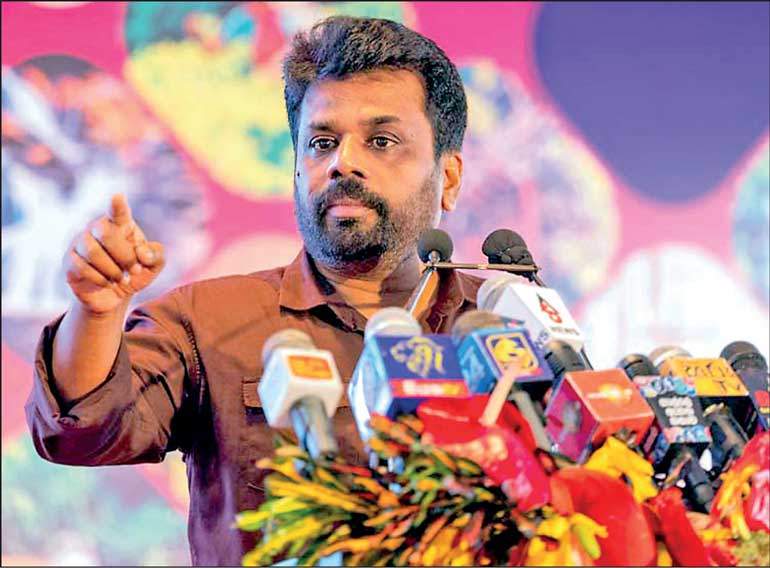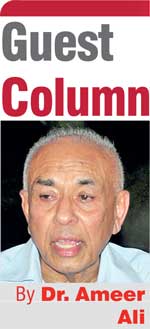Sunday Mar 01, 2026
Sunday Mar 01, 2026
Tuesday, 28 March 2023 00:25 - - {{hitsCtrl.values.hits}}

NPP Leader Anura Kumara Dissanayake
 The increasing popularity of National People’s Power with an uncompromising stand on system change, a demand originated from the Aragalaya youth, seems to have sent jitters within the ruling coalition and their parliamentary opponents who are now united to destroy this colossus. One member from SJB had even called for a merger between his party and the UNP-SLPP coalition just to defeat the NPP at the polls. It is the threat of the NPP sweeping the polls that also made President RW look for excuses to postpone the Local Government Elections (LGEs); and facing defeat, the opposition parties that were initially demanding LGEs have now decided to remain muted.
The increasing popularity of National People’s Power with an uncompromising stand on system change, a demand originated from the Aragalaya youth, seems to have sent jitters within the ruling coalition and their parliamentary opponents who are now united to destroy this colossus. One member from SJB had even called for a merger between his party and the UNP-SLPP coalition just to defeat the NPP at the polls. It is the threat of the NPP sweeping the polls that also made President RW look for excuses to postpone the Local Government Elections (LGEs); and facing defeat, the opposition parties that were initially demanding LGEs have now decided to remain muted.
On an intellectual level, one or two pundits of political science and a few academics, and members of commentariat, some of whom are supporters or sympathisers of these parties, have engaged in a futile exercise of labelling and debating whether NPP is a typical leftist populist movement or a bunch of Marxist radicals and anarchists, who would, if given the chance to govern, end democracy and establish with violence, if necessary, a form of lumpen dictatorship. Such labelling and debates could go on ad nauseam. But the fact of the matter is, the current economic crisis with its IMF remedial agenda has drawn the line between NPP on one side and almost all other political groups on the other.
The fundamental issue that divides the two camps is whether the current economic crisis is part of a polycrisis caused by a socio-political system founded on ethnonationalism that set the trajectory of Sri Lanka’s economic mismanagement for decades and therefore calls for system change or, just an aberration caused by the COVID pandemic in combination with the autocratic excesses of former president Gotabaya Rajapaksa (GR). The fact that the same coalition that governed during GR’s presidency is continuing to rule without GR but with his nominee WR is testimony to the current regime’s belief that the economic crisis is an aberration, although of a serious kind, and it could be overcome with yet more borrowed funds and forced sacrifices imposed on the innocent citizenry in the name of patriotism.
Whereas NPP alone believes that this approach is only a patchwork exercise without addressing the core issue of getting rid of a derelict socio-political system and the culture it produced. The NPP is therefore viewed as a mortal threat by the guardians of the status quo, which explains why they are uniting to confront this new coalition.
NPP is a coalition of 28 parties and organisations, headed by JVP under Anura Kumara Dissanayake. Unfortunately, the rebellious and violent past of JVP in the 1970s and 1980s, when AKD and his team were children, and the physical losses and mental trauma caused by that violence are still afresh and agonising the families of the victims, and these are facts that cannot be denied and be recognised. But what is not being recognised by NPP’s critics is the fact that the new generation of JVP leaders and members of that coalition belong to a vastly different and globally integrated world in which no government or economy could operate in isolation.
All radical economic and political models of the pre-1980 era have undergone epochal transformation and their old heroes are all dead and gone. Today’s JVP is a new avatar and NPP’s political and economic ideologies and operative models have to incorporate elements of this paradigm shift. The party’s policy makers are intelligent, qualified, and pragmatic enough to understand and work within the new environment. Therefore, to brand NPP-JVP as inherently violent, revolutionary, and totally state-centrist is to display the critics’ own intellectual obscurantism. Yet, there is nothing to lose by the NPP leadership to say sorry for past mistakes as the former Australian Prime Minister Kevin Rudd did to the country’s first nation community.
Be that as it may, there is a sigh of relief if not celebration among the guardians of the system to learn that the IMF has released the first tranche of $ 333 million from the promised $ 2.9 billion under its Extended Fund Facility. That release is expected to unlock an expected $ 7 billion more from other sources such as the World Bank and Asian Development Bank. It may also give a sigh of relief to the local moneyed and propertied classes whose fortunes were hit by the economic crisis and may face another hit from the shock waves of recent collapse of two financial megaliths, the Silicon Valley Bank and Credit Suisse. The ripple effects of this collapse are yet to reach the shores of small open economies like Sri Lanka.
Once again, no economist or financial wizard predicted this collapse, which goes to show how fragile the world financial system is despite all guarantees of institutional safety and stability. 2023 is going to be yet another year of economic slowdown globally and the IMF knows it. Having contracted by almost 8% in 2022, the Sri Lankan economy is facing further contraction in 2023 also. By how much is anyone’s guess. Growth projections have become a controversial issue in debt restructuring negotiations.
But as the IMF induced economic pain starts suffocating the masses in months to come a determined president would have no choice but to resort to repressive measures to control public unrest. The IMF had never been the friend of the poor and needy. It is an institution that takes care of the rich and powerful. And the primary intention behind IMF’s help is to protect the interests of Sri Lanka’s creditors and keep the Indian Ocean Island within the West’s zone of influence. Its reparative measures, described as “brutal” by one of its spokespersons, without insisting on system change would be a blessing to the rich and powerful but a curse to the poor and powerless.
RW’s chimera of a Valhalla in 25 years is certainly not going to satisfy the Aragalaya generation. It is that generation’s cry for system change and NPP’s willingness to take up that cause which makes this coalition formidable to be beaten at the ballot box. How long is RW going to delay an election? Let him watch closely what is happening in neighbouring Pakistan.
In the meantime, it is imperative for NPP leadership to clear the air surrounding its alternative package and development trajectory. The solution to the economic crisis lies in the revival of the real economy which had been neglected by governments in the past and in the interest of building the financial sector. The IMF is now helping to protect and stabilise that sector expecting financial stability to enable the real economy to grow. But the real economy needs direct and positive intervention and assistance.
At the same time, the market needs to turn consumer friendly without remaining investor centred. And above all, the collective synergy of all communities needs to be harnessed in the interest of reviving the real economy. All this demands a change in the system. It is time NPP leadership explains the nature of that change in languages understood by everybody.
Let the critics shout, caravan must move.
(The writer is attached to Murdoch Business School, Murdoch University, Western Australia.)